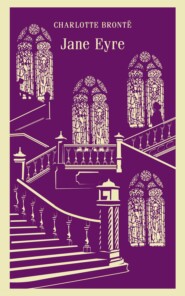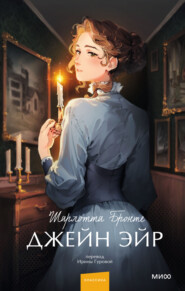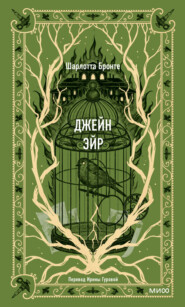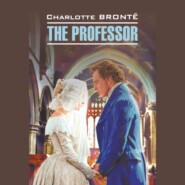По всем вопросам обращайтесь на: info@litportal.ru
(©) 2003-2025.
✖
Джейн Эйр / Jane Eyre
Настройки чтения
Размер шрифта
Высота строк
Поля
The conversation, thus turned on Adèle, continued till we reached the light and cheerful region below. Adèle came running to meet us in the hall, exclaiming:
‘Mesdames, vous êtes servies!’ adding, ‘J’ai bien faim, moi!’[33 - Дамы, обед подан! Что касается меня, я ужасно голодна! (фр.)]
We found dinner ready, and waiting for us in Mrs. Fairfax’s room.
Chapter XII
The promise of a smooth career, which my first calm introduction to Thornfield Hall seemed to pledge, was not belied on a longer acquaintance with the place and its inmates. Mrs. Fairfax turned out to be what she appeared, a placid-tempered, kind-natured woman, of competent education and average intelligence. My pupil was a lively child, who had been spoilt and indulged, and therefore was sometimes wayward; but as she was committed entirely to my care, and no injudicious interference from any quarter ever thwarted my plans for her improvement, she soon forgot her little freaks, and became obedient and teachable. She had no great talents, no marked traits of character, no peculiar development of feeling or taste which raised her one inch above the ordinary level of childhood; but neither had she any deficiency or vice which sunk her below it. She made reasonable progress, entertained for me a vivacious, though perhaps not very profound, affection; and by her simplicity, gay prattle, and efforts to please, inspired me, in return, with a degree of attachment sufficient to make us both content in each other’s society.
This, par parenthèse,[34 - Par parenthèse – между прочим.] will be thought cool language by persons who entertain solemn doctrines about the angelic nature of children, and the duty of those charged with their education to conceive for them an idolatrous devotion; but I am not writing to flatter parental egotism, to echo cant, or prop up humbug; I am merely telling the truth. I felt a conscientious solicitude for Adèle’s welfare and progress, and a quiet liking for her little self; just as I cherished towards Mrs. Fairfax a thankfulness for her kindness, and a pleasure in her society proportionate to the tranquil regard she had for me, and the moderation of her mind and character.
Anybody may blame me who likes, when I add further, that, now and then, when I took a walk by myself in the grounds; when I went down to the gates and looked through them along the road; or when, while Adèle played with her nurse, and Mrs. Fairfax made jellies in the storeroom, I climbed the three staircases, raised the trap-door of the attic, and having reached the leads, looked out afar over sequestered field and hill, and along dim sky-line – that then I longed for a power of vision which might overpass that limit; which might reach the busy world, towns, regions full of life I had heard of but never seen – that then I desired more of practical experience than I possessed; more of intercourse with my kind, of acquaintance with variety of character, than was here within my reach. I valued what was good in Mrs. Fairfax, and what was good in Adèle; but I believed in the existence of other and more vivid kinds of goodness, and what I believed in I wished to behold.
Who blames me? Many, no doubt; and I shall be called discontented. I could not help it; the restlessness was in my nature; it agitated me to pain sometimes. Then my sole relief was to walk along the corridor of the third storey, backwards and forwards, safe in the silence and solitude of the spot, and allow my mind’s eye to dwell on whatever bright visions rose before it – and, certainly, they were many and glowing; to let my heart be heaved by the exultant movement, which, while it swelled it in trouble, expanded it with life; and, best of all, to open my inward ear to a tale that was never ended – a tale my imagination created, and narrated continuously; quickened with all of incident, life, fire, feeling, that I desired and had not in my actual existence.
It is in vain to say human beings ought to be satisfied with tranquillity; they must have action; and they will make it if they cannot find it. Millions are condemned to a stiller doom than mine, and millions are in silent revolt against their lot. Nobody knows how many rebellions besides political rebellions ferment in the masses of life which people earth. Women are supposed to be very calm generally; but women feel just as men feel; they need exercise for their faculties, and a field for their efforts, as much as their brothers do; they suffer from too rigid a restraint, too absolute a stagnation, precisely as men would suffer; and it is narrow-minded in their more privileged fellow-creatures to say that they ought to confine themselves to making puddings and knitting stockings, to playing on the piano and embroidering bags. It is thoughtless to condemn them, or laugh at them, if they seek to do more or learn more than custom has pronounced necessary for their sex.
When thus alone, I not unfrequently heard Grace Poole’s laugh; the same peal, the same low, slow ha! ho! which, when first heard, had thrilled me; I heard, too, her eccentric murmurs; stranger than her laugh. There were days when she was quite silent; but there were others when I could not account for the sounds she made. Sometimes I saw her; she would come out of her room with a basin, or a plate, or a tray in her hand, go down to the kitchen and shortly return, generally (oh, romantic reader, forgive me for telling the plain truth!) bearing a pot of porter. Her appearance always acted as a damper to the curiosity raised by her oral oddities; hard-featured and staid, she had no point to which interest could attach. I made some attempts to draw her into conversation, but she seemed a person of few words; a monosyllabic reply usually cut short every effort of that sort.
The other members of the household, viz.,[35 - Viz. – (а) это.] John and his wife, Leah the housemaid, and Sophie the French nurse, were decent people; but in no respect remarkable; with Sophie I used to talk French, and sometimes I asked her questions about her native country; but she was not of a descriptive or narrative turn, and generally gave such vapid and confused answers as were calculated rather to check than encourage inquiry.
October, November, December passed away. One afternoon in January, Mrs. Fairfax had begged a holiday for Adèle, because she had a cold; and, as Adèle seconded the request with an ardour that reminded me how precious occasional holidays had been to me in my own childhood, I accorded it, deeming that I did well in showing pliability on the point. It was a fine, calm day, though very cold; I was tired of sitting still in the library through a whole long morning; Mrs. Fairfax had just written a letter which was waiting to be posted, so I put on my bonnet and cloak and volunteered to carry it to Hay; the distance, two miles, would be a pleasant winter afternoon walk. Having seen Adèle comfortably seated in her little chair by Mrs. Fairfax’s parlour fireside, and given her her best wax doll (which I usually kept enveloped in silver paper in a drawer) to play with, and a story-book for change of amusement; and having replied to her ‘Revenez bientôt, ma bonne amie, ma chère Mdlle. Jeannette,’[36 - Возвращайтесь скорее, моя добрая подруга, моя дорогая мисс Джейн. (фр.)] with a kiss I set out.
The ground was hard, the air was still, my road was lonely; I walked fast till I got warm, and then I walked slowly to enjoy and analyse the species of pleasure brooding for me in the hour and situation. It was three o’clock; the church bell tolled as I passed under the belfry; the charm of the hour lay in its approaching dimness, in the low-gliding and pale-beaming sun. I was a mile from Thornfield, in a lane noted for wild roses in summer, for nuts and blackberries in autumn, and even now possessing a few coral treasures in hips and haws, but whose best winter delight lay in its utter solitude and leafless repose. If a breath of air stirred, it made no sound here; for there was not a holly, not an evergreen to rustle, and the stripped hawthorn and hazel bushes were as still as the white, worn stones which causewayed the middle of the path. Far and wide, on each side, there were only fields, where no cattle now browsed; and the little brown birds, which stirred occasionally in the hedge, looked like single russet leaves that had forgotten to drop.
This lane inclined up-hill all the way to Hay; having reached the middle, I sat down on a stile which led thence into a field. Gathering my mantle about me, and sheltering my hands in my muff, I did not feel the cold, though it froze keenly; as was attested by a sheet of ice covering the causeway, where a little brooklet, now congealed, had overflowed after a rapid thaw some days since. From my seat I could look down on Thornfield; the grey and battlemented hall was the principal object in the vale below me; its woods and dark rookery rose against the west. I lingered till the sun went down amongst the trees, and sank crimson and clear behind them. I then turned eastward.
On the hill-top above me sat the rising moon; pale yet as a cloud, but brightening momentarily, she looked over Hay, which, half lost in trees, sent up a blue smoke from its few chimneys; it was yet a mile distant, but in the absolute hush I could hear plainly its thin murmurs of life. My ear, too, felt the flow of currents; in what dales and depths I could not tell; but there were many hills beyond Hay, and doubtless many becks threading their passes. That evening calm betrayed alike the tinkle of the nearest streams, the sough of the most remote.
A rude noise broke on these fine ripplings and whisperings, at once so far away and so clear; a positive tramp, tramp, a metallic clatter, which effaced the soft wave-wanderings; as, in a picture, the solid mass of a crag, or the rough boles of a great oak, drawn in dark and strong on the foreground, efface the aerial distance of azure hill, sunny horizon, and blended clouds where tint melts into tint.
The din was on the causeway; a horse was coming; the windings of the lane yet hid it, but it approached. I was just leaving the stile; yet, as the path was narrow, I sat still to let it go by. In those days I was young, and all sorts of fancies bright and dark tenanted my mind; the memories of nursery stories were there amongst other rubbish; and when they recurred, maturing youth added to them a vigour and vividness beyond what childhood could give. As this horse approached, and as I watched for it to appear through the dusk, I remembered certain of Bessie’s tales, wherein figured a North-of-England spirit called a ‘Gytrash,’ which, in the form of horse, mule, or large dog, haunted solitary ways, and sometimes came upon belated travellers, as this horse was now coming upon me.
It was very near, but not yet in sight; when, in addition to the tramp, tramp, I heard a rush under the hedge, and close down by the hazel stems glided a great dog, whose black and white colour made him a distinct object against the trees. It was exactly one form of Bessie’s Gytrash – a lion-like creature with long hair and a huge head; it passed me, however, quietly enough; not staying to look up, with strange pretercanine eyes, in my face, as I half expected it would. The horse followed – a tall steed, and on its back a rider. The man, the human being, broke the spell at once. Nothing ever rode the Gytrash; it was always alone; and goblins, to my notions, though they might tenant the dumb carcasses of beasts, could scarce covet shelter in the commonplace human form. No Gytrash was this – only a traveller taking the short cut to Millcote. He passed, and I went on; a few steps, and I turned; a sliding sound and an exclamation of ‘What the deuce is to do now?’ and a clattering tumble, arrested my attention. Man and horse were down; they had slipped on the sheet of ice which glazed the causeway. The dog came bounding back, and seeing his master in a predicament, and hearing the horse groan, barked till the evening hills echoed the sound, which was deep in proportion to his magnitude. He snuffed round the prostrate group, and then he ran up to me; it was all he could do – there was no other help at hand to summon. I obeyed him, and walked down to the traveller, by this time struggling himself free of his steed. His efforts were so vigorous, I thought he could not be much hurt; but I asked him the question:
‘Are you injured, sir?’
I think he was swearing, but am not certain; however, he was pronouncing some formula which prevented him from replying to me directly.
‘Can I do anything?’ I asked again.
‘You must just stand on one side,’ he answered as he rose, first to his knees, and then to his feet. I did; whereupon began a heaving, stamping, clattering process, accompanied by a barking and baying which removed me effectually some yards’ distance; but I would not be driven quite away till I saw the event. This was finally fortunate; the horse was re-established, and the dog was silenced with a ‘Down, Pilot!’ The traveller, now stooping, felt his foot and leg, as if trying whether they were sound; apparently something ailed them, for he halted to the stile whence I had just risen, and sat down.
I was in the mood for being useful, or at least officious, I think, for I now drew near him again.
‘If you are hurt, and want help, sir, I can fetch some one either from Thornfield Hall or from Hay.’
‘Thank you; I shall do. I have no broken bones – only a sprain;’ and again he stood up and tried his foot, but the result extorted an involuntary ‘Ugh!’
Something of daylight still lingered, and the moon was waxing bright. I could see him plainly. His figure was enveloped in a riding cloak, fur collared and steel clasped; its details were not apparent, but I traced the general points of middle height and considerable breadth of chest. He had a dark face, with stern features and a heavy brow; his eyes and gathered eyebrows looked ireful and thwarted just now; he was past youth, but had not reached middle-age; perhaps he might be thirty-five. I felt no fear of him, and but little shyness. Had he been a handsome, heroic-looking young gentleman, I should not have dared to stand thus questioning him against his will, and offering my services unasked. I had hardly ever seen a handsome youth; never in my life spoken to one. I had a theoretical reverence and homage for beauty, elegance, gallantry, fascination; but had I met those qualities incarnate in masculine shape, I should have known instinctively that they neither had nor could have sympathy with anything in me, and should have shunned them as one would fire, lightning, or anything else that is bright but antipathetic.
If even this stranger had smiled and been good-humoured to me when I addressed him; if he had put off my offer of assistance gaily and with thanks, I should have gone on my way and not felt any vocation to renew inquiries; but the frown, the roughness of the traveller, set me at my ease; I retained my station when he waved to me to go, and announced:
‘I cannot think of leaving you, sir, at so late an hour, in this solitary lane, till I see you are fit to mount your horse.’
He looked at me when I said this; he had hardly turned his eyes in my direction before.
‘I should think you ought to be at home yourself,’ said he, ‘if you have a home in this neighbourhood; where do you come from?’
‘From just below; and I am not at all afraid of being out late when it is moonlight; I will run over to Hay for you with pleasure, if you wish it; indeed, I am going there to post a letter.’
‘You live just below – do you mean at that house with the battlements?’ pointing to Thornfield Hall, on which the moon cast a hoary gleam, bringing it out distinct and pale from the woods that, by contrast with the western sky, now seemed one mass of shadow.
‘Yes, sir.’
‘Whose house is it?’
‘Mr. Rochester’s.’
‘Do you know Mr. Rochester?’
‘No, I have never seen him.’
‘He is not resident, then?’
‘No.’
‘Can you tell me where he is?’
Вы ознакомились с фрагментом книги.
Приобретайте полный текст книги у нашего партнера:
Приобретайте полный текст книги у нашего партнера:

















